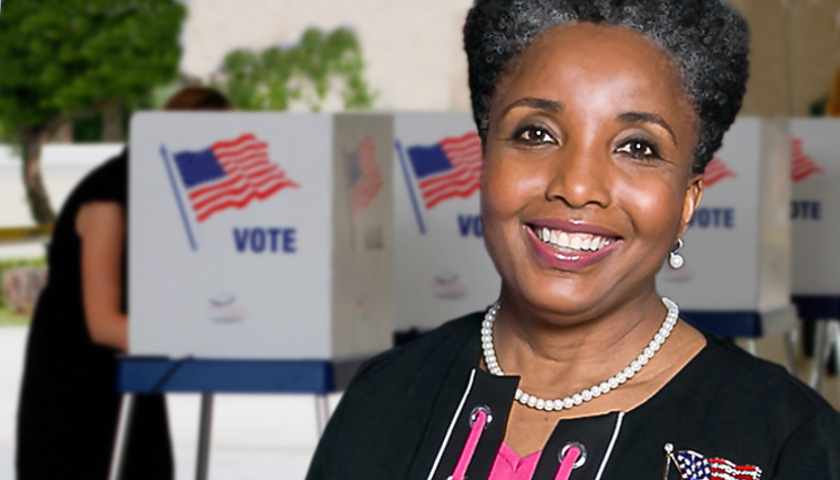by Dr. Carol M. Swain
From the Democrats, we get “Every vote should be counted.” Hidden in these words is an effort to legitimize votes cast by non-citizens and others who might not have had legal standing to vote on November 6. That was in the wake of the state of Florida’s passage of legislation to allow convicted felons who have paid their debts to society to vote. The cry from Republicans is quite different. Republicans believe Democrats are bent on stealing elections using any means necessary.
Democrats have established a pattern of seeking the relaxation of voter-identification requirements. They argue that requests for state-issued identification discriminates against black voters, when a lax system makes it easier for non-citizens and convicted felons to vote. Nationally, we have not done enough to protect the integrity of the electoral system. Only 34 of the 50 states require voter identification at the polls. Other states accept easily accessible documents such as utility bills, paychecks, and bank statements.
Things have begun to change, though. Since 2005, there has been a greater push to require photo identification. Efforts to require photo identification have been met by pushback from those who argue requiring such documents is discriminatory because blacks and other minorities are less likely to have access to identification. Ignored in that flimsy argument is the fact that photo identification is required to obtain public assistance, to purchase alcohol and cigarettes, to board a flight, and to gain admission into numerous public and private venues. The list gets longer.
Republicans have a valid fear of being disadvantaged in those states and localities lacking requirements for voting. A 2014 study by Professor Jesse Richman and co-authors Gulshan Chatta and David Earnest at Old Dominion University used data from the 2008 and 2010 elections to conclude that “some non-citizens participate in U.S. elections, and that this participation has been large enough to change meaningful election outcomes including Electoral College votes, and Congressional elections.” Harvard University Professor Stephen Ansolabehere challenged the results of the Richman study arguing that the peer-reviewed study was flawed. Other reports, however, from around the country have shown that non-citizens are registering and casting votes that can determine outcomes in close elections. In fact, a 2017 lawsuit filed by the Public Interest Legal Foundation found that 100,000 non-citizens were registered to vote in Pennsylvania and had been voting for at least a decade due to a glitch in the motor vehicle registration process.
Similarly, a 2012 Pew Study found a different set of problems affecting the integrity of the electoral process. The study estimated that “one out of every eight voter registrations is inaccurate, out-of-date or (a) duplicate,” about “2.8 million people are registered in more than one state. . .and 1.8 million registered voters are dead.” In close elections, there is room enough for voter fraud to tip the scales for a political party willing to engage in shenanigans. (See Hans von Spakovsky and John Fund’s 2016 Wall Street Journal article, “Do Illegal Votes Decide Elections?”).
In this past election, all eyes were on Florida and Georgia. Brenda Snipes, the Broward County supervisor in Florida, is no stranger to controversy. Her actions are not above suspicion. In 2016, a judge ruled that Snipes had incorrectly destroyed ballots in a race involving Republican Tim Canova’s unsuccessful bid to unseat Debbie Wasserman Schultz (who was just coming off a six-year stint as chairperson of the Democratic National Committee. Shocking). Ballots were prematurely destroyed after Canova contacted Snipes asking for access to original paper ballots in March 2017. He never received the ballots, which were destroyed in September 2017 in violation of state law, which required Snipes to certify that no legal proceedings were pending. Snipes’ defense was she made a mistake in signing off on a folder that authorized the destruction of the original ballots. She also admitted that convicted felons and non-citizens had been allowed to vote in previous elections.
After days of delay, the contested FL elections have been certified for the Republicans, but investigations of wrongdoing continue. The biggest bright spot is that Snipes has announced plans to resign.
In Georgia, after fighting the results for days Stacy Abrams, the black gubernatorial candidate, gave a non-concession speech accusing former Secretary of State, Brian Kemp, of suppressing the black vote. Since there is not a scintilla of evidence supporting her allegation, it come across as a desperate attempt to help set the stage for the 2020 elections by feeding a false narrative about GOP racism.
We have learned from the 2018 midterm elections that voter fraud, court interventions, and innovative measures that allow voting to continue beyond Election Day are part of a new Democratic Party strategy to flip results. This is unacceptable.
There is a strong need for electoral reform at the federal level. Congress needs to pass bipartisan legislation to protect the integrity of our ballots by instituting a uniform requirement for voter identification and providing funding to standardize and upgrade voting machines. We also need to increase the penalties for voter fraud whether perpetrated by elected officials or by overzealous partisans. Too much is at stake for our Democratic Republic for us to do less.
– – –
Dr. Carol Swain is an award-winning political scientist, a columnist for The Epoch Times, and the host of The Be the People Podcast heard on the America Out Loud Talk Radio Network. Her most recent book is Debating Immigration: The Second Edition. An earlier version of this article was published in The Epoch Times.




